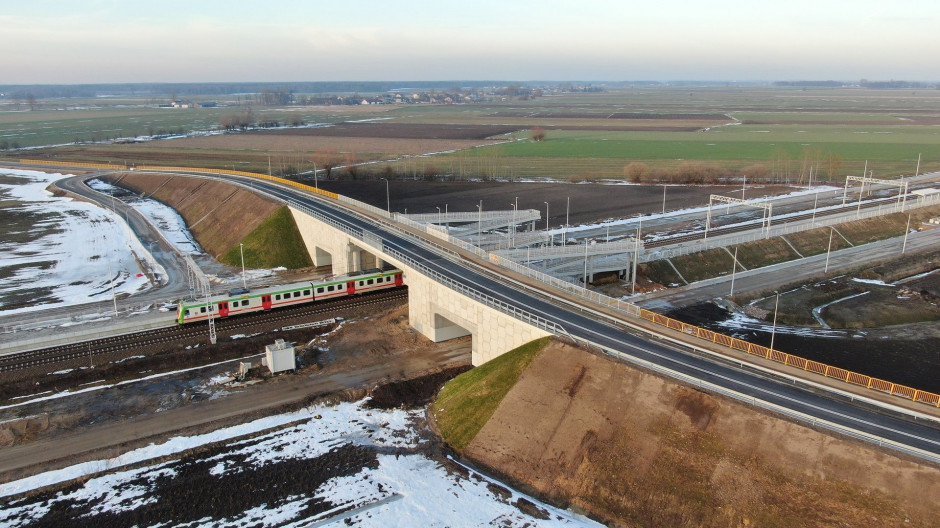- EDITIONS
- FOR THE MEDIA
- CONTACT
- EEC MEMBERS
- EEC TRENDS
- PO POLSKU

New contracts, stabilisation of procurement, long-term certainty of financing and certification of companies admitted to tenders – these issues are on the list of recommendations for the new government formulated by the infrastructure construction industry at EEC Trends in Warsaw.
The list of important issues for the industry was drawn up during the “Infrastructure and construction” debate at the at the EEC Trends conference in Warsaw which was attended by the new Deputy Minister of Infrastructure responsible for railways, Piotr Malepszak, alongside the heads of construction companies. Among other things, he announced a rapid verification of the projects carried out by PKP PLK in terms of their effectiveness for rail traffic.
“I understand that the Ministry has to review the PKP PLK projects, but it is impossible not to refer to the situation in the last two years. Due to the lack of the National Reconstruction Plan funding, that has been a very difficult period for the railway construction industry. Tenders were not launched or, if they were, contracts were not signed after the winner was selected. The expectation in the industry that this will change is very high, and this is true of both contractors and building material manufacturers. All the more so as the current contracts are coming to an end and there are no new ones”, said Artur Popko, CEO of Budimex.
“Railway construction is in a state of collapse due to the low number of contracts signed in recent years. If funding becomes available, contracts will need to be signed quickly”, added Wojciech Trojanowski, a member of Strabag’s management board.
Contracts that are negotiated, but which cannot be signed due to lack of funds, have become nick-named as “asterisk” contracts, but not from the Christmas star in December, but from the asterisk denoting the link.
The asterisk contracts do not create demand. It is almost the middle of the third EU perspective and PKP PLK still has PLN 15 billion to spend from the second perspective from 2014-20. This is beneficial in a way for contractors, but not for building material manufacturers, as their production has already been purchased and stored. Now they need new orders.
“One would have to look at the leading rail managers in Europe, such as Network Rail in the UK, which places contracts for three to five years, but no less than three years. If it buys less than the contracted amount in a given year, it participates in the costs of maintaining the manufacturer’s production capacity”, described Krzysztof Niemiec, Vice President of Track Tec.
As he added, when the company realised in H1 2023 that the government’s announcements of PLN 16.5 billion worth of new railway investments would not materialise, a decision was made to increase exports. Under the preliminary year-end summary, it turns out that more than 50 per cent of Track Tec’s revenue is generated in foreign markets. For its managers, this is quite satisfying, as not every product for railway construction is suitable for export due to logistics costs, and foreign ordering parties are increasingly asking about the carbon footprint of production.
Order stability for producers of materials, but also for contractors, is a fundamental issue. The industry is scared as hell of the so-called ups and downs in orders. Over the past 20 years, following the availability of EU funds to modernise Poland’s railway infrastructure, the phenomenon has already occurred. And, unfortunately, it looks like it will occur once again.
EU funds for the railways will come in a big wave sooner or later, and it must be remembered that road and energy investments in the modernisation of the network will also queue up for the procurement of construction services and the acquisition of materials. We know what the risk of this is: price increases and missed deadlines.
According to Artur Popko, the peak in construction will occur in 2025 and 2026. It is therefore urgent that the timeframe of the National Reconstruction Plan be extended.
“Accumulation cannot be avoided. Time cannot be turned back. Instead, it is possible to try to plan the flow of EU funds into the market in a way that is optimal for contractors, and for manufacturers. “You can’t do it ‘on the spur of the moment’”, said Wojciech Trojanowski, given that the industry is feeling the fear of a fight for resources and inflation higher than in the rest of the economy.
What does the industry expect from the new government, apart from the opening of the sack of new contracts and their stable financing? This can be summed up in a few points.
How important the certification of companies is shown by the example of Budimex, which has entered the German, Czech, Slovak and Norwegian markets. A completely different principle applies there than in our country.
“Poland is the biggest construction site in Europe, but also the most open. It is very difficult for contracting authorities to verify the reliability of the bids submitted. Low deposits even encourage so-called companies in the briefcase to submit bids”, said Artur Popko.
In Germany, it took Budimex two years and cost PLN 20 million to obtain certification. The staff had to pass German language exams and the company had to buy the appropriate equipment and demonstrate it. What’s more, if something goes wrong with the orders, the document can be withdrawn. In the Czech Republic, three years after entering the market there, Budimex cannot submit a single bid, because the contracting authority requires that the specified personnel have a perfect command of the Czech language.
“In Poland, it is enough to indicate in the tender documents that the company has references and potential, which no one can verify”, said Artur Popko, adding that this attracts companies from China, Korea, Turkey and even Kazakhstan to Poland.
Meanwhile, in the neighbouring countries, the railway market is particularly protected so that ‘nobody messes up’. According to the CEO of Budimex, non-EU companies should have limited access to our market.
Deputy Minister Piotr Malepszak addresses industry recommendations
Piotr Malepszak, Deputy Minister of Infrastructure, addressed the industry’s demands directly during the EEC Trends debate, emphasising that when it comes to public money, he does not tell fairy tales but uses arguments backed up by numbers.
Therefore, the first topic of his discussions with the Minister of Infrastructure, Dariusz Klimczak, but also with the Ministry of Finance, was the Railway Fund.
“We need to solve the problem of continuity and stability of funding for railway investments. It is a pathology that one industry has this stability and the other does not”, said Piotr Malepszak, who realises that road construction is fundamentally important for the country, but this does not mean that a sustainable source of money for the railways does not need to be ensured.
The Deputy Prime Minister also promised that more smaller tasks for PLN 100-200 million, which were previously the domain of state-owned companies, would be brought to the open market. This includes contracts for the repair and maintenance of the railway network, which large private construction companies are also interested in.
“There are high-quality machines in PKP PLK subsidiaries, but when I compared, for example, the work of a tamping machine for PLN 35 million, it turned out that Budimex has the same one working three times as much. We want to use the potential of the entire market, including that of PKP PLK, but also to make optimum use of public money”, he said.
He added that he saw signs of regression in PKP PLK. A turnout takes up to two weeks to replace, while in the 1980s it took eight hours.
As far as the National Reconstruction Plan is concerned, however, for the time being there is no question of postponing the completion date of the investments beyond August 2026. There are still two and a half years to go and no country in the EU is yet putting the matter firmly on the table in Brussels. The period up to August 2026 should be used to the best possible advantage by launching as many simple tasks as possible that will quickly raise the quality of the Polish railway system.
According to the Deputy Minister, much can be done here. When he left his job at PKP PLK in 2016, there were 2,000 permanent speed restrictions on the network. Today that figure is the same. Some restrictions have been lifted, but new ones have appeared. The railway traffic is not made any easier. There are also cardinal errors to be corrected.
“The line from Białystok via Bielsk Podlaski to Hajnówka and on to Czeremcha was opened with long delays. On 30 km of the single-track line, there is no station, no passing. After 30 km we enter Hajnówka and there too the trains cannot pass each other. “A traffic curio, and there are dozens of such cases”, said Piotr Malepszak, adding that the so-called precision measures will be carried out alongside large investments of multi-billion scale. All the more so as Poland needs new railway lines. In what form will become clear after the audit of the Central Communication Port project.
The Deputy Infrastructure Minister declared, referring to the demand for a reduction in “departmental Poland”, that he would look for synergies wherever he could.
“One thing Polish railways need is investment in infrastructure, the second is investment in rolling stock and the third, perhaps the most important, is organisation. Operators should cooperate with each other. The liberalisation of the passenger transport market and the introduction of independent carriers will have limited, but nonetheless significant, effects. All of these measures should be correlated with transport policy at city and regional level”, said Robert Tomanek, ESG expert, EcoGreen, Rector of the University of Economics in Katowice from 2016 to 2020, Undersecretary of State at the Ministry of Labour and Technology from 2020 until 2021.
As Krzysztof Niemiec concluded, the railways must present a viable alternative, especially in freight carriage. Due to the increase in the price of road transport, business will be increasingly interested in railway transport. An important moment could be the inclusion of road transport in the ETS in 2027. Today it is estimated that emitting a tonne of CO2 could then cost EUR 130. To “produce” one tonne of CO2, it is enough to burn 370 litres of diesel in the engine.
“The jump in road transport costs will be so significant that people will look at the railways and ask what we have done to make its offer attractive”, said Krzysztof Niemiec at EEC Trends.

You watching archival version of European Economic Congress
What you can do:
Go to the current edition page or Continue browsing